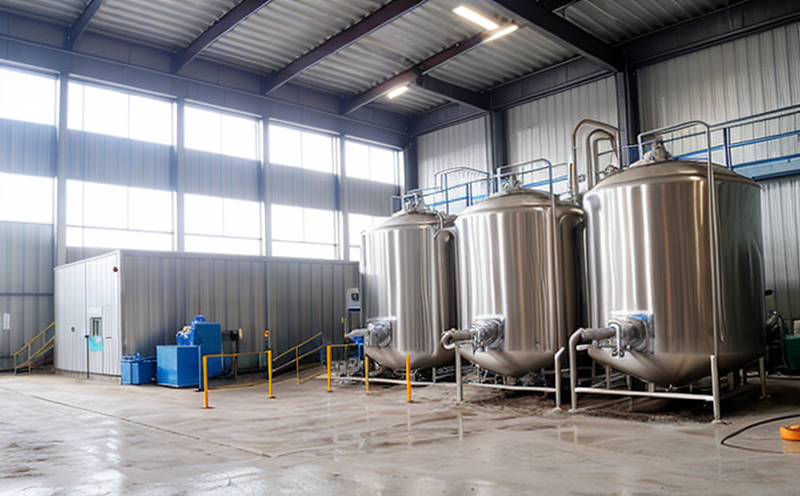ASTM D7065 Pesticide Residues Test in Process Water
The ASTM D7065 Standard Practice for Determining Pesticide Residues in Process Water is a critical tool used by industries to ensure compliance with environmental regulations and safety standards. This test evaluates the presence of pesticide residues in process water, which can originate from various sources such as agricultural runoff or accidental contamination.
Industrial processes that rely on high-purity water, like electronics manufacturing, pharmaceutical production, and semiconductor processing, must adhere to stringent quality control measures. The ASTM D7065 test ensures the safety of the final product by identifying potential contaminants, thus safeguarding both the environment and human health. This service is particularly important for sectors where even trace amounts of pesticides can compromise product integrity.
The process involves collecting water samples from the industrial site and transporting them to our accredited laboratory. Here, we use advanced analytical techniques such as gas chromatography-mass spectrometry (GC-MS) or liquid chromatography-tandem mass spectrometry (LC-MS/MS), which are sensitive enough to detect trace amounts of pesticides.
Once the samples are prepared and analyzed, our team interprets the data against established international standards, such as ISO 17025. This ensures that the results are reliable and can be trusted by regulatory bodies worldwide. We provide detailed reports outlining any detected residues along with their concentrations, which helps in making informed decisions regarding water treatment processes.
The ASTM D7065 test plays a vital role in maintaining compliance with environmental regulations like the Clean Water Act (CWA) and ISO 14001. By detecting pesticide residues early on, industries can implement corrective measures promptly, preventing potential environmental damage or legal issues down the line. This proactive approach not only enhances operational efficiency but also contributes positively to sustainability initiatives.
In addition to its regulatory importance, this test supports research and development efforts aimed at improving water treatment technologies. By identifying specific pesticides present in process water, we help manufacturers optimize their purification methods for greater effectiveness while minimizing resource consumption.
Our expertise in ASTM D7065 testing allows us to offer comprehensive solutions tailored specifically for your industry needs. Whether you need routine monitoring or one-off assessments, our team will work closely with you to ensure accurate and timely results that meet all relevant requirements.
Why It Matters
The importance of ASTM D7065 testing cannot be overstated in today’s world. With increasing concerns over environmental pollution and public health, industries must take responsibility for minimizing their impact on natural resources. By conducting regular pesticide residue tests according to this standard practice, companies demonstrate their commitment to sustainable practices.
- Reduces risks associated with contaminated process water leading to product quality issues
- Ensures adherence to strict environmental protection laws and regulations
- Promotes trust between manufacturers and consumers regarding product safety
- Aids in continuous improvement of water treatment processes through detailed analytical data
- Supports compliance audits conducted by regulatory authorities ensuring ongoing operational efficiency
- Fosters innovation within the industry encouraging development of more efficient purification techniques
In summary, ASTM D7065 testing is essential for maintaining high standards of quality and safety across all stages of industrial processes involving water usage. It serves as a benchmark against which industries can measure their performance continuously improving practices for better outcomes.
International Acceptance and Recognition
The ASTM D7065 standard has gained widespread recognition among international bodies responsible for setting environmental standards. Its acceptance is due to the rigorous scientific methods employed during analysis which provide accurate results consistently across different laboratories worldwide.
Many countries have incorporated ASTM D7065 into their national standards and guidelines, ensuring uniformity in testing procedures globally. This harmonization fosters collaboration between nations striving towards common goals related to water quality improvement and protection.
Regulatory agencies such as the European Union (EU) and United States Environmental Protection Agency (EPA) have acknowledged ASTM D7065 for its robustness and reliability making it an accepted choice among professionals engaged in environmental monitoring activities. Moreover, organizations like ISO have referenced ASTM D7065 in their own standards further validating its significance.
By adhering to ASTM D7065 practices, industries not only meet regulatory requirements but also position themselves as leaders committed to responsible resource management. This commitment resonates positively with stakeholders including customers, investors, and the broader community enhancing overall corporate reputation.
Environmental and Sustainability Contributions
The ASTM D7065 pesticide residues test contributes significantly to environmental sustainability by identifying potential sources of contamination early on allowing for timely interventions. Here are some ways this testing supports environmental conservation:
- Prevention of Water Pollution: Early detection helps prevent accidental release into aquatic ecosystems, preserving biodiversity.
- Promoting Cleaner Production Processes: Identifying pesticide residues enables process optimization reducing overall chemical footprint.
- Enhancing Resource Efficiency: By pinpointing specific contaminants, industries can focus on targeted solutions improving resource utilization.
- Safeguarding Public Health: Ensuring safe water supply reduces risks associated with harmful substances affecting human health.
- Fostering Responsible Industry Practices: Regular testing encourages continuous improvement in environmental stewardship practices among manufacturers and suppliers alike.
Through diligent application of ASTM D7065, we contribute to a healthier planet by supporting industries in their journey towards sustainability. Our commitment extends beyond compliance ensuring long-term benefits for all stakeholders involved.





